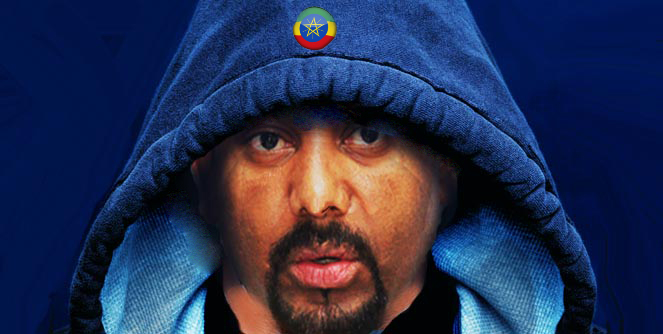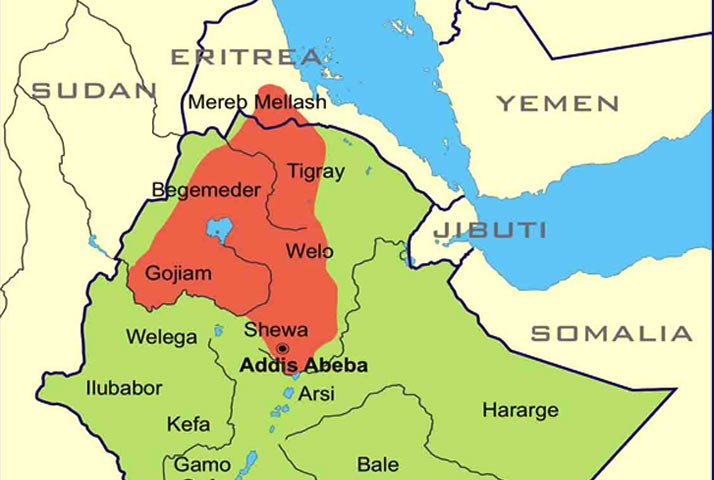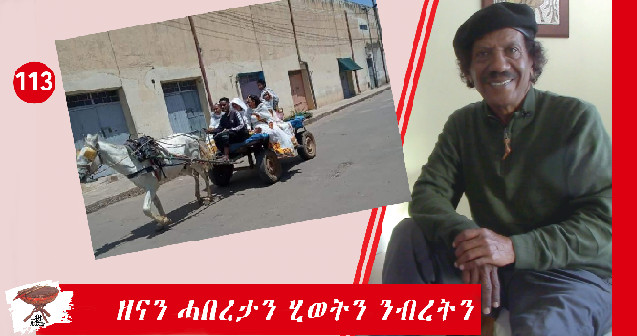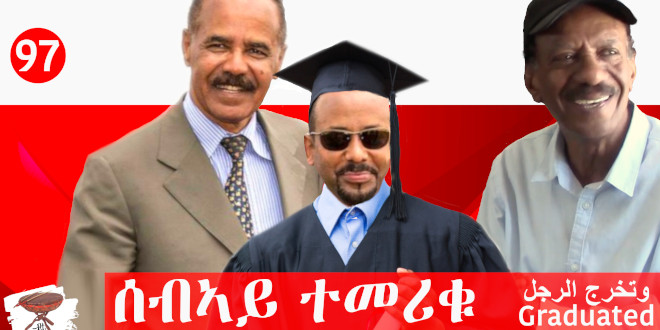Eritreans Are Forced to Be Obsessed with Ethiopia

Your Excellency Prime minister Abiy Ahmed,
Happy New Year to you, your family and the people of our region.
Last April I was elated by your election to the position of Prime Minister, and for the first few days, I was very optimistic and very impressed with the way you handled the myriad of Ethiopian crisis. Sadly, that admiration waned quickly, after which it was an anti-climax when you gravitated towards Isaias Afwerki, the tormentor of Eritreans. Worse, you embraced the chauvinists of Abyssinia, both Eritreans and Ethiopians, whom you attracted like a queen bee. That is where I lost you.
I also used to like your predecessor Mr. Hailemariam Desalegn until he spoiled it by posing with Mengistu Hailemariam in a tasteless move as if he was making a point.
Until then, I had one serious misgiving towards the EPRDF whose policy of institutionalizing and reviving ethnic nationalism I thought was a time bomb. But I must confess; initially, I did consider it just an experiment and consoled myself believing it was not my business. But gradually I became disillusioned when I witnessed a frantic move to impose that system in Eritrean politics.
I was aggravated when the EPRDF, through the so-called Sana’a Forum, treated the Eritrean struggle as an intelligence project and steered it with policies devised to manage lackeys and servile elements.
Your Excellency,
In fact, out of the many names that were floating for the top position, I predicted (almost betted with an Ethiopian friend) that you will win—later I joked with that friend telling him not to underestimate my political aroma sniffing skill.
Dear prime minister, I hope you understand some of us are too focused on Eritrean affairs, particularly its reckless leader, and its isolationist ruling party. I can’t help but take a stand on issues based on how it reflects on the common Eritrean vis a vis the PFDJ. Unfortunately, that is where you failed me and many others.
In my eyes, all your much-talked-about peaceful gestures, reformist pronouncements, and cleverly crafted political messages, like the infamous Medemer slogan (Major Dawit Invited Me to Dr. Abiy’s Medemer Class) quickly became vague and colorless messages. However, still, I cannot help but admire the way you craft your messages to the extent that it feels like you are on a perpetual campaign trail, always poised to win.
Until the PFDJ injustice forced me to change my personality and my priorities, I was a marketing professional. Therefore, it was natural for me to admire your presentations, campaigns, and other promotional tactics that I considered a work of genius. I don’t think any world-grade advertising or PR agency would have come with better marketing plans. Very impressive indeed.
Mr. prime minister, the government that you replaced was busy molding and shaping the Eritrean opposition and preparing it as a tool for its own interest; but you, like a municipal officer confiscating the wares of the poor Mercato Chercharo, simply dropped it on an old rug, wrapped it, and threw it over the nearest cliff you came across.
Please understand that I am not accusing you of not babysitting the Eritrean opposition; I am also not accusing you of failing to see the ramifications of your actions. That is because I would be foolish to believe you didn’t understand the gravity of sidelining Eritreans in your quest for peace… though strangely, you chose to make a deal with a tyrant, over an air corridor, that connects you with the toll collector alone, the notorious Isaias Afwerki! I ask myself, why would Dr. Abiy think he can achieve peace with a dictator in isolation of the stakeholders? Worse, how could Ethiopia coexist peacefully with Eritrea only over the air by avoiding Tigrai?
My second disappointment is your selective gestures–while you empowered the forces of disarray that wreaked havoc for centuries all over the region, you seem to create other force (or forces) that might wreak equal havoc in the region again!
Mr. prime minister, during my first ever visit to Ethiopia in 1991, I noticed the mood—a serious anti-TPLF sentiment by the sympathizers of the two previous Ethiopian regimes. At that time, the EPLF was in cahoots with the TPLF and it shared the wrath of those elements equally when it cemented an exclusive friendship that alienated all others who didn’t belong to the two organizations. I thought it was natural and will evolve in time, and things will balance out. I honestly believe the balancing was going on in Ethiopia, albeit the slow pace. On the contrary, nothing was happening in Eritrea except more suffering. As expected, the PFDJ would not have enough consolidation of power even when it controlled every economic, military, and political power in Eritrea. And it became more ruthless by the day to the extent we began to question the goal of our long struggle! Eritreans felt betrayed, wronged, and humiliated as a nation when you went out of your way to throw a life buoy to save the Eritrean dictator.
I do not mean to question your knowledge about the decades of sufferings that we went through, but I think you were in your teens when that was happening—I can’t blame you since you were just a young boy like all other boys. Now imagine people suffering since you were in middle school… and still suffering! And there are other disturbing signs that do not bode well with people who aspire to see peace reign in our region.
Last week I watched a rally in Gondar where a chauvinist person, clad in fatigues, strapped with ammunition belts, adorned with a Kalashnikov rifle, while he ranted about occupying Tigrai, and bringing back the factories from there, to Gondar I presume. How is that kind of hate speech being delivered under your watch? How is it possible for hundreds of thousands of people to be displaced because of violence and communal strife under your watch? How has Wellega turned into a war zone under your watch? How is it possible that citizens cannot move inside Ethiopia freely in certain regions unless they belong to certain ethnicities? How is it that minorities like the Harrari and other people feel threatened in their own homes under your watch?
Dear Prime Minister,
Corruption is rampant in many countries; only countries that dealt with the root causes of corruption have succeeded in establishing an equitable, just, and honest societies. The main solution is obviously the supremacy of the Rule of Law and its spread, which includes reward and punishment, as well as transparency and accountability under the law. And though financial corruption takes precedence, many other aspects of corruption are more crippling and lethal to a society. Unfortunately, financial corruption is easy to understand, easy to communicate, and an effective populist message that people can relate to.
Your anti-corruption drive seems to have veered into the partisan political sphere. It’s common knowledge that in its populist perception, the famous slogan, ye qen jiboch (the daylight hyenas) have come to signify a certain group more than the rest.
I have visited Ethiopia many times and I have seen enough; the entire economy was corrupt. But understandably, anywhere in the world, transforming a command economy–a socialist one at that–to a free market economy goes through the despicable corrupt route. Naturally, in the long run, since that problem is structural, only institutionalization and rule of law can resolve it. True, the journey starts with bringing suspects to the courts though it has to be, and look, legally bound–away from a political witch-hunt. So far, the fanfare and the media trials, accompanied with dangerous insinuations and raw nerve massaging, was a corruption disguised as a fight against corruption and it reeks of a corrupt political muscle flexing. As such, in a country with shaky ethnic composition, disturbed with regional agitations, it may prove to be very damaging to the Ethiopian (and the region’s) quest for peace.
Mr. Prime Minister, I have followed the developments of the Ethiopian opposition factions and their leaders for a long time. For now, let me throw the spotlight on Dr. Berhanu Negga–though in my eyes, he still remains guilty of promoting Isaias–I believe he has come a long way. He appears to be a true patriot, qualified, and for many reasons, less susceptible to financial corruption. Why is it that moderates like him are in the shadows while the spotlight is beaming over the Derg operatives (the Qey Bahrachin lots) and ancient regime worshippers? That, as an Eritrean, worries me a lot.
![]() Mr. Prime Minister, writing this message was not easy, I hesitated so much because I was afraid it would reinforce the impression that Eritreans are too obsessed with Ethiopia. Understandably, a layman would ask: why so much interest in Ethiopia when Eritreans have enough problems of their own? But as an avid student of the history of the region, I was always subjected to a repeated watching of many movies badly produced in Ethiopia, and one more movie starring the Red Sea is about to be shown again! The same tormenting, scratchy, badly directed movie with unrefined actors.
Mr. Prime Minister, writing this message was not easy, I hesitated so much because I was afraid it would reinforce the impression that Eritreans are too obsessed with Ethiopia. Understandably, a layman would ask: why so much interest in Ethiopia when Eritreans have enough problems of their own? But as an avid student of the history of the region, I was always subjected to a repeated watching of many movies badly produced in Ethiopia, and one more movie starring the Red Sea is about to be shown again! The same tormenting, scratchy, badly directed movie with unrefined actors.
That is why the obsession of Eritreans with anything Ethiopian is justifiable: 1) It’s the feudal chauvinists who are obsessed with Eritrea due to, A) Primordial imperial romance, and B) Inter-Abyssinian rivalry, and 2) the Eritrean side suffers of, A) Hate and grudges conceived by the elite, and B) General popular anxiety and mistrust.
A few years ago I spoke at a function and tried to identify our mutual problems. I held (and still hold) the problems are mainly caused by inter-Abyssinian rivalry. Many people appreciated my input while many others hated my guts for spelling it out, or thought it was too sensitive an issue. Unfortunately, the topic was, and still is, a taboo. Of course, such topics are too sensitive to be handled by people like that man who spoke at a rally in Gonder. But I have to mention that Meles Zenawi was the most senior person who acknowledged my argument. When I met him for an interview in 2011, he said to me, “I read your speech and you make compelling arguments.” It’s a weighty remark.
It’s with the above in mind that I tried my best to elevate the debate where intellectuals, scholars (and preferably reputable institutions) can take a lead. I made proposals, talked and appealed to people, but the power that be, politicians who do not recognize a role for anyone but themselves, stone-walled my initiatives that got nowhere, utter failure.
In short, Mr. Prime Minister, if you were the angel of death and you gave Isaias a chance to tell you his last wish before you snatched his life, his last wish will obviously be: ‘Oh Angel of death, destroy the TPLF for me!’ It’s an obsession. And unfortunately, I believe he is playing Ethiopians for that purpose. It is not the fight of the region’s people.
Last week I read that your government approved a bill to create a reconciliation commission. Not to undermine your other activities, but I believe that is the most important project you will ever undertake. Incidentally, reconciliation has always been my goal and my wish for the people of the region. That kind of endeavor lays the groundwork for the long-term stability and prosperity of Ethiopia and the entire region. It’s a long overdue move and it’s of utmost importance. I wish you luck from the bottom of my heart–I believe the focus on ethnicity has run its course and it has become a scary liability for peace and prosperity. But what do I know of such problems? I know a little, and here is a first-hand observation:
In 2011 I stayed in a small hotel in Hawassa where I met Mulatu, a young man in his early twenties, who was the errand boy at the hotel. All the guest at the hotel ordered him around to do their errands: Mulatu, can you call a shoeshine boy! Can you get me a cigarette from the shop, etc… He survived on the small change the guests gave him for his services. At the hotel, there were local police officers who stood guard 24 hours a day. I asked Mulatu, “you have high school education and you’re more fit than the guards, why don’t you join the police force instead of living as an errand boy and wasting your life?” He looked at me almost in tears, “Gashe, I was born and raised here, but I am an Amhara and they would not hire me to join the police force.” It was a sad revelation to me and I asked him, “then, why don’t you go to the Amhara region?” To which he replied, “here is where I was born and raised, this is my place even if I belong to a different ethnic group.”
The little understanding of ethnic federation I had was lost after I talked to Mulatu. I hated it–the thought of that kind of system being implemented in Eritrea sent shivers down my spine.
Mr. Prime Minister,
Funnily, our dictator has given you the mandate to lead Eritrea! He could have meant it as a sign of humility which confusingly enough doesn’t exist in his vocabulary. However, though minuscule, that joke gives me an excuse to engage you in Eritrean affairs which disappointedly, is lost on the Ethiopian media which took it lightly. However, after months of disappointing opinions of the Ethiopian journalist and intellectuals, I am elated—the euphoria has evaporated, a few people have started to sober down, and they are beginning to expose the sufferings of Eritreans under the tyrant, “ISSU”.
Like all underdeveloped countries, our region suffers from ethnic, regional, sectarian, and many other ills that don’t encourage the respect of the rights of citizens. Even now as you are preparing for your next election, I am perplexed thinking about the possibility of building a nation-state without advancing and respecting the right of citizens, in alienation of their sub-national identities. All successful nation-states in the world are anchored on a foundation of the rights of citizens—the Magna Carta, The Bill of Rights, etc. I am not sure if a system standing on clannish and other sub-national identities can build a successful nation-state? However, I recognize that realities dictate the policies of any government, but all that can be challenged successfully if the journey ultimately leads to unifying the people as citizens by rejecting the damaging statuesquo. We all need a system that doesn’t disadvantage minorities–and not in an affirmative action process alone, but–based on a true foundation of equality of citizens. That is a challenge that faces all our region and beyond, and I wish you luck.
Finally, Mr. Prime Minister, the obsession of Ethiopians with Eritrea (the Red Sea to be specific) has always been our nightmare and still, it is. For me, if the Red Sea is of no benefit to Eritreans (and to the people of Dankalia in particular) I wouldn’t shed a drop of tear if it dries up and no drop of water is left in it. And if Assab cannot serve Ethiopia (as I have articulated many times “Unusual: Imagining Asseb Through Djibouti”), it’s like a shop owner in a neighborhood who boycotts all the residents of the neighborhood–what is the wisdom in wishing to trade with a people with whom you are at odds?
The damage is deep. Wrong understanding of sovereignty, the blind nationalist type, has prevented people from getting closer on issues that matter: Justice, peace, and prosperity. It’s only then that developments take their natural course and evolve into an ideal situation without fear, without wars, and without bloodshed.
Dear Mr. Prime Minister, I wish you luck, and also wish you wisdom in distancing yourself from political lepers. That could be seen as my selfish wishes, but you know my selfish wish goes beyond me and engulfs the entire region. And my selfish instincts tell me I cannot enjoy a peaceful existence while my neighbors are at each other’s throats.
Related Reading:
Major Dawit Woldegiorgis: More Of Red Tears (July 2, 2009)
Unusual: Imagining Asseb Through Djibouti (June 3, 2011)
Major Dawit Invites Me to Dr. Abiy’s Addition Class (July 16, 2018)




Awate Forum